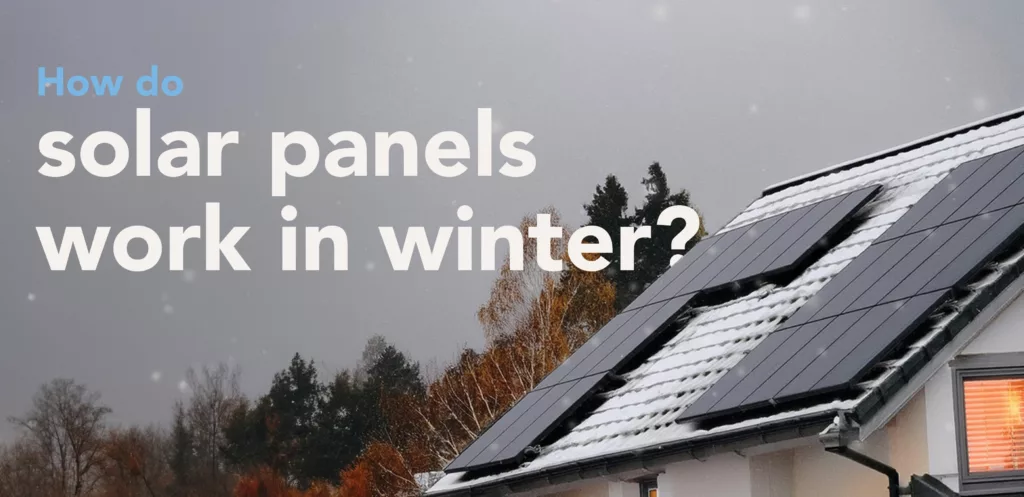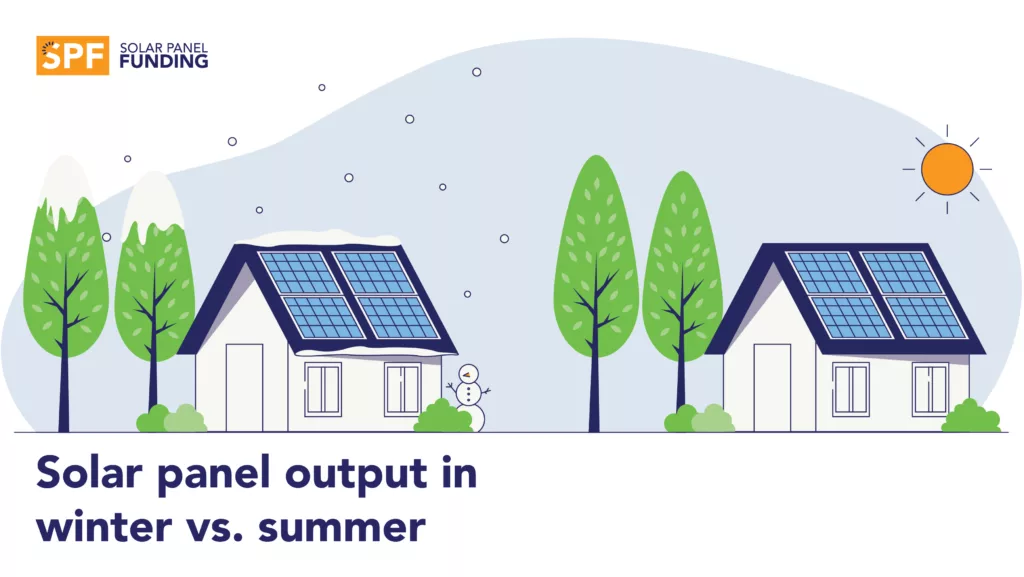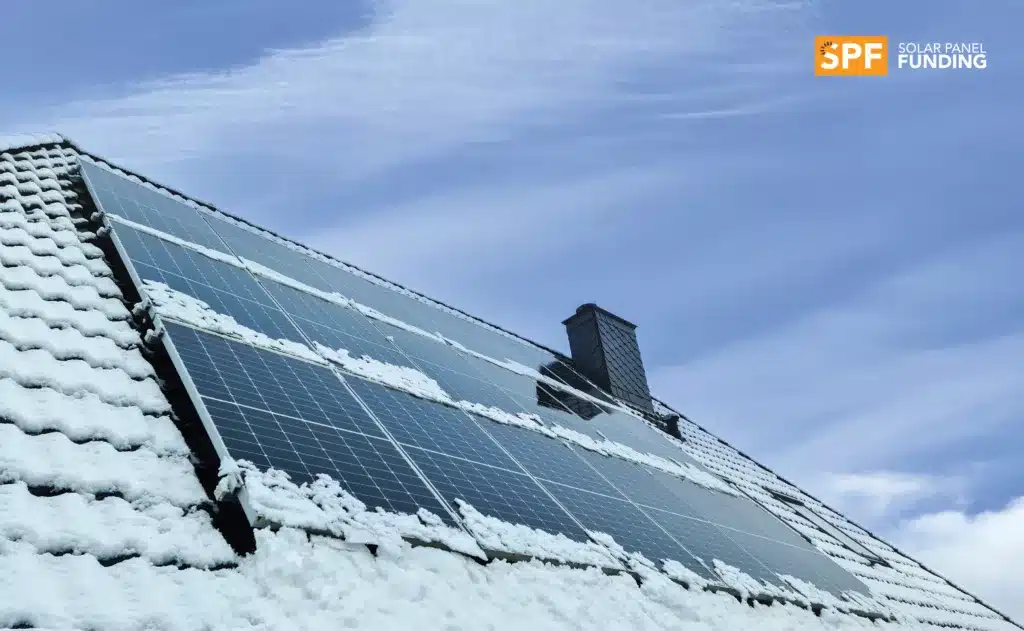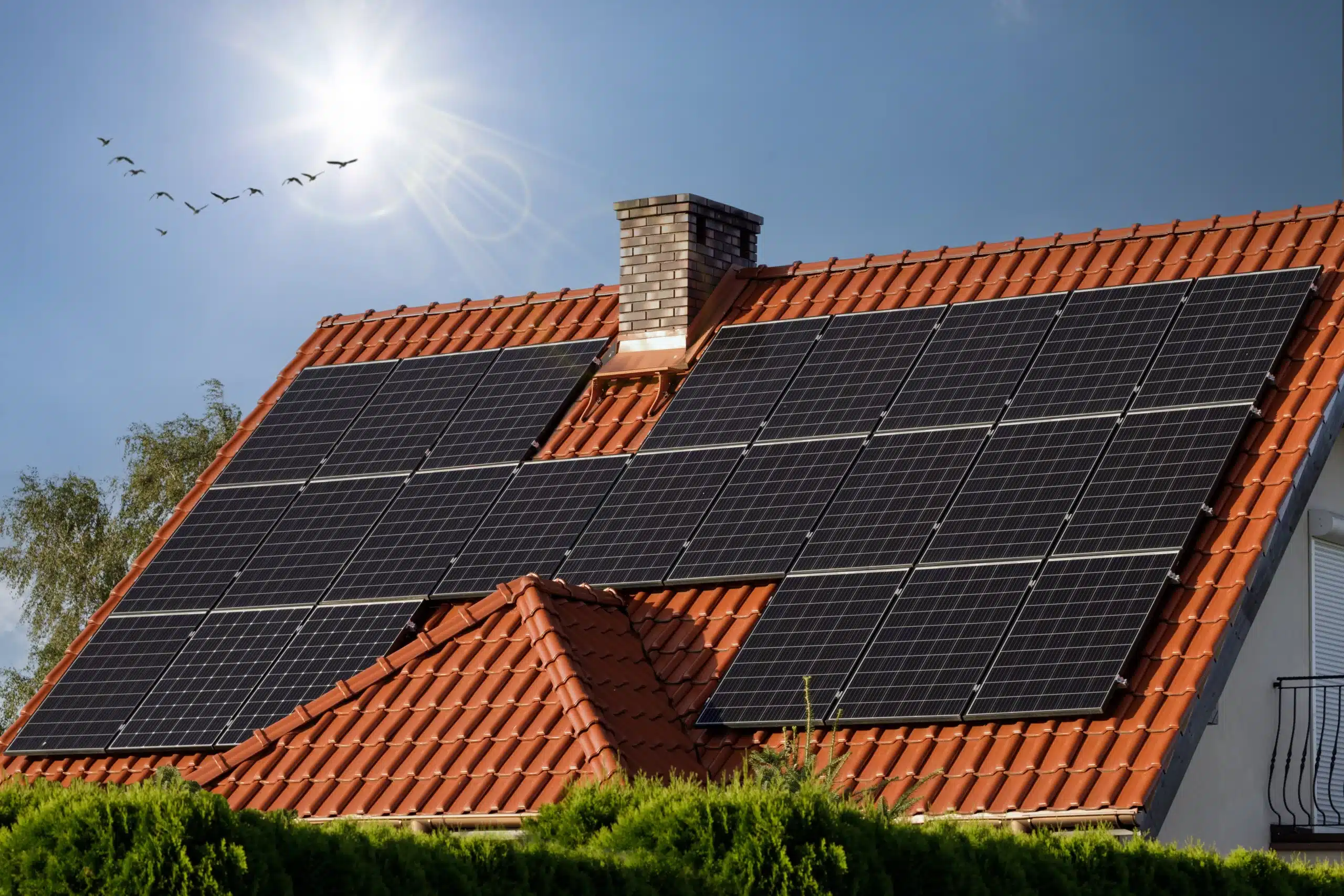
Do solar panels work in winter? This question plagues potential investors all over the country, however, solar panels can still generate plenty of electricity on cold, cloudy winter days? In fact, during winter, solar panels in the UK can still produce up to 70% of their peak output, despite shorter days and overcast skies.
As winter sets in, many begin to question: how do solar panels work in this sort of weather? Temperatures lowered by Arctic Chill, reduced sunlight and longer nights often lead to misconceptions about solar energy’s in the winter months. However, these systems are designed as all-seasons solar panels and many factors contribute to their ability to generate power even during the darkest days.
In this blog, we’ll explore how solar panels in winter perform, address common concerns about efficiency and provide insight into solar panel funding options and government-funded solar panels, making it easier for homeowners to invest, no matter the season.

How do solar panels work in winter?
Solar panels convert sunlight into electricity using photovoltaic (PV) cells. These cells, typically made of semiconductor materials like silicon, absorb photons from sunlight. When sunlight hits the cells, it knocks electrons loose, creating a current that can be used for powering homes and businesses.
Are solar panels less efficient in winter?
In short, yes. However, the impact is likely less than you’d think. Solar panels are designed to be most efficient when they receive direct sunlight, meaning they don’t need to be exposed to full sunlight to generate electricity. Even on an overcast day, PV cells can still produce (slightly less) energy. This is particularly important in winter when days are shorter and skies are often cloudier.
On the contrary, during winter, the lower temperatures can benefit solar panels. Cold weather allows the panels to operate more efficiently because they are less likely to overheat – a factor that can decrease performance during the summer months. Solar panels are also designed to work in low light, meaning they can still generate power even on dimmer, shorter winter days.

Solar panel output in winter vs. summer
While not debilitating, solar panels experience a difference in efficiency between seasons. In summer, the extended daylight hours and stronger sunlight allow solar panels to generate more electricity – often a significantly higher output compared to winter. On a bright summer day, solar panels in the UK can generate up to 30-40% more energy than in winter.
However, despite reduced sunlight in winter, solar panels in winter can still provide a substantial amount of energy, with solutions like solar battery storage being supportive for particularly dark days.

Solar panel funding | Why it’s always a good time to invest!
Government Incentives and Solar Funding:
Winter is as good a time as any to invest in solar panels, especially when there are options within funding for solar panels. There are several incentives available to help homeowners reduce the upfront cost of installing solar panels, which can come as a particular assistance in the colder months when energy demand increases. Programs like the Smart Export Guarantee (SEG) ensure that any extra energy generated from solar panels can be sold back to the grid, providing a steady, passive income stream that helps to offset installation costs. Additionally, the government offers low-interest loans and subsidies for renewable energy systems, which can make the winter months an ideal time to upgrade your energy source.
Navigating the financial landscape of solar panels
With rising energy prices, the long-term financial benefits of solar power are becoming more apparent by the year. By switching to solar power, homeowners can reduce their electricity bills significantly. The existence of solar panel funding options allows homeowners to install energy-efficient systems at a reduced cost, making the investment more accessible. By capitalizing on incentives like tax rebates, grants and low-interest financing options, the financial burden of switching to solar is significantly reduced.

Maximising solar panel efficiency in the winter months
To ensure optimal performance in winter, homeowners need to take the time to maintain their solar panels properly – at the very least booking in an inspection here and there. Snow, ice and debris (especially from shedding plant life) can accumulate on panels, reducing their ability to capture sunlight. Although panels are generally self-cleaning, it is a good idea to periodically clear any snow or ice blocking sunlight. In milder climates, where snow isn’t a major concern, it’s important to remove leaves, branches, and other debris that can reduce efficiency.
In short, regular cleaning and clearing will help to ensure that your solar panels are operating at maximum capacity.
Investment in battery storage
In winter, when solar generation is lower due to shorter days, installing a solar battery can provide some invaluable benefits, in terms of both energy efficiency and secured independence. Solar batteries store excess energy generated on sunny days, leaving homeowners with a bank ready for use during darker, colder months. By investing in battery storage, homeowners can ensure they have a backup power supply when sunlight is scarce – often more than they’ll even need to need in the winter. This allows users to make the most of their solar panels, even in winter, and reduce their reliance on the grid.
Panel positioning
Homeowners can also improve winter performance by ensuring their panels are positioned at an angle that maximizes sunlight exposure during the winter months. Regular maintenance and storage solutions such as solar batteries will ensure that energy needs are met throughout the year, despite the lower energy output during winter compared to the summer months.
By taking these steps, homeowners can maximise their solar panel output in winter, making their systems as effective as possible, regardless of the season.

Solar panel systems are for all seasons
Those living in regions with harsh winters should definitely consider investing in solar panel systems. These systems are built to withstand snow, ice, and other weather conditions without a significant reduction in efficiency. And even with a reduction in efficiency, saving on bills will likely make all the difference in the harshest financial times of the year.
Don’t let winter weather freeze out your solar ambitions
So, do solar panels work in winter? The answer is clearly a resounding yes! While solar panels in winter may produce less energy than in summer, they are still effective at generating power throughout the colder months, especially if homeowners take measures to maximise their efficiency. Key factors such as roof angle, panel quality and geographic location can impact performance, but even in the UK’s harsh winters, solar panels provide significant energy savings. Solar Panel Funding also opportunities are also making this renewable energy solution more accessible than ever, reducing the financial burden of installation.
If you’re considering solar panels but are unsure whether they’ll work in winter, now is the perfect time to explore the kind of work that we’re doing at Solar Panel Funding. We’re the only non-government organisation in the country that’s offering assistance to homeowners looking to make a positive change to their home. With our government incentives like SEG, tax credits and the optional financial assistance we’re offering, installing solar panels can save you money year-round while also benefiting the environment.
Winter should not be seen as a barrier to solar power – in fact it might be the time of year that solar panels can have the most profound benefit to homeowners. With the right solar panel system, regular maintenance and strategic placement, solar panels will continue to work efficiently, providing energy savings throughout the year.
Do solar panels work on cloudy days?
Yes, solar panels can still generate electricity on cloudy days, though at a reduced rate compared to clear, sunny days. The panels rely on diffused sunlight, which is present even when the sky is overcast. (Kind of like how some people say you still need sunscreen in overcast!)
Are solar panels less efficient in winter?
Yes, solar panels are less efficient in winter due to shorter days and lower sun angles. However, they still provide considerable energy and can significantly reduce electricity bills during colder months, especially with optimisation techniques.
How do solar panels reduce electricity bills in winter?
Even with reduced sunlight in winter, solar panels still generate energy that can offset the amount of electricity purchased from the grid, reducing monthly energy bills. Systems like SEG coupled with battery storage systems can also be helpful for generating more passive income.
To learn more about solar panels, general energy-saving techniques and how to secure funding for your own systems, visit our blog today. It’s our mission to bring solar panels to all the homes that want them!




